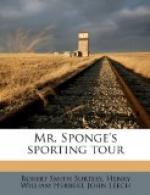These farms serve the double purpose of purveyors to the London stables, and hospitals for sick, overworked, or unsaleable horses. All the great job-masters and horse-dealers have these retreats in the country, and the smaller ones pretend to have, from whence, in due course, they can draw any sort of an animal a customer may want, just as little cellarless wine-merchants can get you any sort of wine from real establishments—if you only give them time.
There was a good deal of mystery about Scampley. It was sometimes in the hands of Mr. Benjamin Buckram, sometimes in the hands of his assignees, sometimes in those of his cousin, Abraham Brown, and sometimes John Doe and Richard Roe were the occupants of it.
Mr. Benjamin Buckram, though very far from being one, had the advantage of looking like a respectable man. There was a certain plump, well-fed rosiness about him, which, aided by a bright-coloured dress, joined to a continual fumble in the pockets of his drab trousers, gave him the air of a ‘well-to-do-in-the-world’ sort of man. Moreover, he sported a velvet collar to his blue coat, a more imposing ornament than it appears at first sight. To be sure, there are two sorts of velvet collars—the legitimate velvet collar, commencing with the coat, and the adopted velvet collar, put on when the cloth one gets shabby.
Buckram’s was always the legitimate velvet collar, new from the first, and, we really believe, a permanent velvet collar, adhered to in storm and in sunshine, has a very money-making impression on the world. It shows a spirit superior to feelings of paltry economy, and we think a person would be much more excusable for being victimized by a man with a good velvet collar to his coat, than by one exhibiting that spurious sign of gentility—a horse and gig.
The reader will now have the kindness to consider Mr. Sponge arriving at Scampley.
‘Ah, Mr. Sponge!’ exclaimed Mr. Buckram, who, having seen our friend advancing up the little twisting approach from the road to his house through a little square window almost blinded with Irish ivy, out of which he was in the habit of contemplating the arrival of his occasional lodgers, Doe and Roe. ‘Ah, Mr. Sponge!’ exclaimed he, with well-assumed gaiety; ’you should have been here yesterday; sent away two sich osses—perfect ’unters—the werry best I do think I ever saw in my life; either would have bin the werry oss for your money. But come in, Mr. Sponge, sir, come in,’ continued he, backing himself through a little sentry-box of a green portico, to a narrow passage which branched off into little rooms on either side.
As Buckram made this retrograde movement, he gave a gentle pull to the wooden handle of an old-fashioned wire bell-pull in the midst of buggy, four-in-hand, and other whips, hanging in the entrance, a touch that was acknowledged by a single tinkle of the bell in the stable-yard.
They then entered the little room on the right, whose walls were decorated with various sporting prints chiefly illustrative of steeple-chases, with here and there a stunted fox-brush, tossing about as a duster. The ill-ventilated room reeked with the effluvia of stale smoke, and the faded green baize of a little round table in the centre was covered with filbert-shells and empty ale-glasses. The whole furniture of the room wasn’t worth five pounds.




